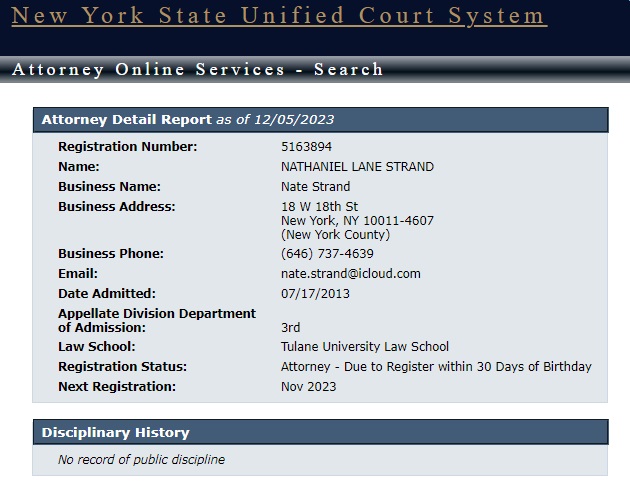Welcome

Greetings and welcome to my website; my name is Nate and I am a tax attorney. This page is about my law practice and the various that I help people with, including tax audits, back taxes, and much more. I'm based in the Upper East Side neighborhood of NYC and I also help people long distance.
I've been in practice since 2011. I'm a graduate of Tulane University in Louisiana and was originally in practice in New Orleans for a few years before relocating here to NYC in 2013. Prior to getting my law license, I was a piano teacher.
Feel free to message me for more. Thank you for visiting my website :)
Services
I help people with many different things, including...
Back Taxes & Missing Returns

Tax Audits & Disputes

International Taxation

State & Local Taxation

...and much more. Feel free to contact me about your specific situation.
Frequently Asked Questions
“Do you do regular tax return preparation?”
Yes.
“How much do you charge? Is it hourly?”
No, it's generally a flat fee in the $375 - $1200 range. (one of the perks of being a solo tax attorney is less overhead and a cheaper costs) Feel free to message me and I'll tell you exactly what things would cost.
"Do you help regular income tax filers with minor tax problems or is this a service that's more for larger companies?"
No, most my clients are individuals and small business. Most tax attorneys do work large law firms representing bigger companies but I am more of a small-time operation. Lucky you :)
“I’m being audited by the IRS and I don’t have any receipts. Am I totally screwed?”
No, not necessarily; it’s legal to use a “reasonable estimate” of expenses. (although not everyone at the IRS is eager to acknowledge this) Typically I’ll use raw documents like bank statements to do a reconstruction of the items in question.
"Do I need an attorney to represent me in an audit?"
No, you can represent yourself. At the end of the audit, the IRS examiner will issue a Form 4549 summarizing their proposed changes; you can either agree to the changes or take the case to Tax Court. Sometimes people will choose to just see what happens in the audit with the option to dispute the result later if necessary. However, you may nonetheless want to consult with me or another tax attorney to get an idea of the strength of the case) Having a representative can also be useful since you will generally not have to personally appear before or talk to the IRS examiner.
“What’s the difference between a tax attorney and other professionals like an enrolled agent?”
The key difference is that tax attorneys can file legal actions on behalf of clients such as a petition to redetermine deficiency. Other professionals like enrolled agents can still speak to the IRS on someone’s behalf, but they are limited to dealing with the IRS and can’t file legal actions. Tax attorneys also might know a little more, at least those of us who actually are properly licensed. (unfortunately a lot of less-reputable firms use the terms "tax attorney" or "tax lawyer" despite not actually having a license...)
"What kind of results can I expect if I want to challenge a tax bill?"
I actually keep stats on my Tax Court outcomes; it's sort of like a batting average for tax attorneys. Of course, those cases represent a small fraction of IRS disputes, but it gives you an idea of what to expect - I can't always get rid of the entire tax bill, but almost always I'm able to reduce some of it.
"Do you handle NYC residency audits? What exactly is the rule for this anyway?”
It’s a little complicated - you have to pay income tax if you are “domiciled” in NYC, or if you are a “statutory resident” of the city. (Either is sufficient) This is also the rule for New York State residency.
“Domiciled” means physically present in the city of New York and mentally intending to stay here. You retain your “domicile” until you establish a new domicile. Thus, for example, if a person lives in NYC for five years and then goes on a 2-year traveling binge, living in 20 different countries for a month or two at a time, he or she would still be considered to have an NYC “domicile”, even though you haven’t spent a lot of time there. “Statutory resident” is a little more simple - it means you spend at least 183 days in NYC and have a “permanent place of abode” here.
NYC residency audits are quite common and a frequent source of dispute so feel free to message me for advice on your situation, based on my past experiences with them.
“I live in one state/country but I’m working in another. Where do I have to file?”
Generally you file a resident tax return where you live, and a nonresident tax return where you work; typically the state of residency will give you a “credit” for the taxes paid to the other state. For example, if you live in Connecticut and work in New York, you would file a nonresident return reporting a tax on the New York wages, and then claim a credit on your resident Connecticut return. Note however that some taxes (such as the NYC income tax) are based on residency and not where you work.
"I need to hire a tax attorney as an expert witness in court; do you have experience with that?"
Yes, I've testified as an expert witness in four different cases. Common reasons to have a tax attorney expert include matrimonial disputes over representation of assets as well as accusations of professional malpractice. (particularly by bookkeepers and accountants)
“I wanna’ see your license!”
Sure, see below.

(and you can always verify it on your own with the state bar of New York...)
Tax attorneys like myself also have something called a “CAF number” (mine is 0308-90462R), which is sort of our authorization to speak on people’s behalf with the Internal Revenue Service.
I'm also licensed in California . Sooooo...if you need a tax attorney on the west coast...
"I received a telephone call about taxes I owe - is this real or a scam?"
It's probably a scam, but feel free to message me. There are a lot of IRS impersonation schemes out there; the real IRS does not call to demand immediate payment, and they rarely contact people via telephone. (if they do, it's usually a local "revenue officer")
"Is the IRS corrupt and evil like some people claim?"
No, not at all. In fact, my fellow tax attorneys who represent the IRS are actually very intelligent and reasonable; the problem is that there have been a lot of IRS funding cuts in recent years which limits their ability to properly review and respond to things. Many of my cases end up in Tax Court not because the IRS was being unreasonable, but because they simply didn't have the resources to process an examination response or an amended tax return.
“What’s this ‘FBAR’ thing I keep hearing about?”
It’s a form that you might be required to file if you have foreign bank accounts over a certain amount. FBAR is one of many reporting forms; others include Form 8938 and Form 3520.
There has been a significant amount of worry and even hysteria over offshore bank account reporting in recent years but most of these fears are unwarranted - the IRS will not impose a penalty if you did not know about the FBAR filing requirement and did not underpay any taxes for the year. (you don’t have to take my word for, this is all on their website)
I have never had a client who was penalized for failure to file an FBAR. (though in many cases we had to amend and pay the additional tax) While there is a procedure called “Voluntary Disclosure” where individuals can pay a fraction of their asset value and avoid further penalty, I’ve never needed to use it.
(Note however that “voluntary disclosure” also refers to a completely different program for New York City and state taxes, where taxpayers can file their delinquent returns and avoid any late penalties. I use this frequently)
“Do you handle criminal cases? (like, white-collar crimes)"
Yes, although they’re much less common; I probably handle one or two of them per year. Criminal investigations tend to be fairly selective and focused on the more egregious offenders.
Visit the contact page to ask your own question.